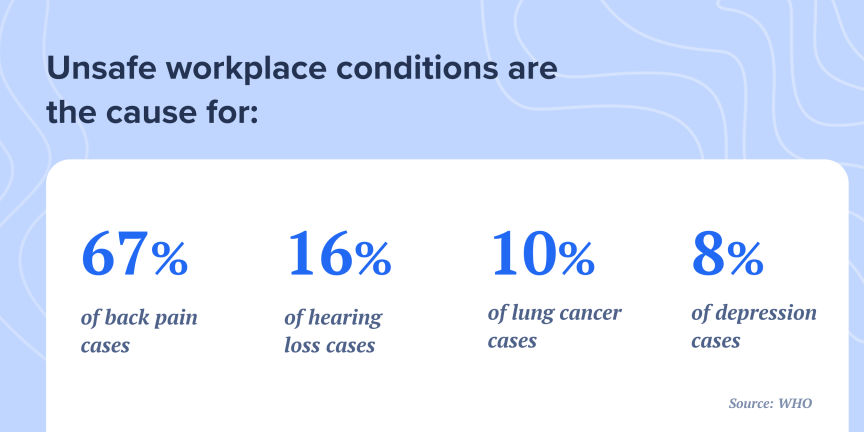The modern corporate professional's daily life is a complex maze of deadlines and commitments. As the world becomes more and more interconnected and easy to reach, it has become much harder for employees to maintain a balancing act between their professional commitments and their health needs. In such cases, a robust, effective and personalized corporate health benefits program can help reduce employees' concerns when it comes to managing their health.
According to a survey published by Kaiser Family Foundation (KFF), 53% of small and medium-sized corporations and 81% of large enterprises offer at least one corporate wellness program, usually focused on weight management, smoking cessation, and coaching for a healthier lifestyle.
However, while many companies are steadily adopting wellness plans, it is equally important to choose a plan which suits the employees and the employer as well. As the pandemic has shown us, adapting to the challenges thrown by uncertain circumstances is not an option, but a mandate. Keeping this in mind, flexible corporate health programs which offer health benefits catered to the specific needs of an employee (and the employer) are the need of the hour, as corporate workplaces around the world adapt to a rapidly changing environment.
The current landscape of corporate health
According to reports by People Matters:
-
40% of employees face higher levels of stress and anxiety due to remote work.
While Work From Home (WFH) has meant a lower disruption to the day-to-day professional commitments of employees, it has nevertheless affected their ability to "switch off" from work at the end of the day.
- The new professional landscape has also led to over 50% of employees facing motivational issues when it comes to carrying out their duties. The reasons for this range from not being able to socialize with co-workers to not being able to focus due to concerns over their own health.
-
Women, in particular, are also facing higher instances of Double Burden Syndrome, where the domestic responsibilities of their home life are adding to the burden of responsibilities in their professional life, and vice-versa.
According to a report by the World Health Organization (WHO), over 160 million cases of work-related illnesses occur every year.
How work affects the health of corporate professionals
-
Work influences physical safety and health - Common hazards that pose threats to the physical safety of the typical office worker include ergonomic hazards such as repetitive motion, awkward posture and excessive eye strain due to long hours spent on electronic devices.
The repercussions of physical inactivity due to long hours spent at one’s desk are felt in daily life, with cases of young professionals suffering from back pain, living a sedentary lifestyle, and excessive weight gain due to the same.
-
Work affects mental health and well-being - Research in the past 30 years has clearly shown that various situations in the workplace can be labelled “psychosocial hazards” because they are related to various conditions related to the psychological and social environment of the workplace, rather than physical conditions alone. These are also referred to as “work stressors”.
-
According to extensive research conducted by the Consortium for Organizational Mental Healthcare (COMH), “Workplace factors may increase the likelihood of the occurrence of a mental disorder, or make an existing disorder worse. These factors may contribute directly to mental distress, such as demoralization, depressed mood, anxiety, mental burnout, etc. Such cases of mental distress may not reach the level of a diagnosable mental disorder, but they can still be a source of considerable suffering for the employee in the long term.”
How employees’ health affects the organization
-
Absenteeism - When employees are ill, regardless of the cause, their productivity at work will be decreased. If the employee is too ill to come to work, it leads to absenteeism-related costs of recruiting and bringing in a replacement worker, training that worker, and the loss of productivity due to the same.
-
Presenteeism - If a physically ill employee comes to work in spite of the illness, it leads to a case of “presenteeism”, which is the reduced productivity of someone who is ill, be it physically or mentally, and therefore not as effective as they would normally be at fulfilling their responsibilities.
-
Burnout - When employees work in a chronically stressful environment, it can lead to a loss of conviction in the work they are doing. This consistent stress and lack of motivation can lead to burnout, which then leads to loss of productivity and job satisfaction for the employee. This in turn leads to a net loss for the organization as well.
How ekincare's corporate health plans can help
A customizable and personalized health plan evolves along with the needs of the organization. Keeping track of physical health with fitness challenges, Annual Health Checks (AHCs), heart health monitoring, among many other health services, are important aspects of a good health plan.
However, as we know now, physical health is only one part of the puzzle, with mental health completing the picture.
ekincare's patented AI-based platform offers a one-stop corporate health benefits solution for all the health needs of an organization. The range of services include:
-
Teleconsultation - Dedicated doctors available on call to answer health queries and provide medical consultations.
-
Annual Health Checks - For all employees to ensure that their health is on track.
-
e-Pharmacy - Home delivery of medications for all users.
-
Personalization - Activities and challenges that suit each user's lifestyle and health goals.
-
Real-time Analytics Dashboard - For HR managers to keep track of their team members' health needs.
-
Mental Health Support - Trained medical personnel who can help manage the mental health and stress of users.
From holistic health activities like yoga and meditation programs, which can keep stress and anxiety in check, to mental health professionals who can help employees with more severe concerns like depression and chronic anxiety - all of these factors combined make for a truly holistic corporate health benefits plan. Such a plan can help skyrocket an organization's overall well-being through the better health of its workforce.
This in turn is the way forward for a healthier, happier and more productive employee-employer relationship as well, paving the way toward a better future for corporations worldwide.

